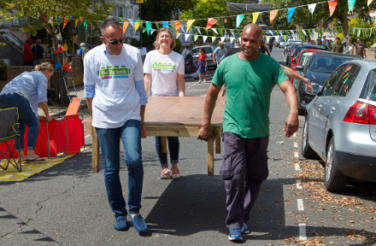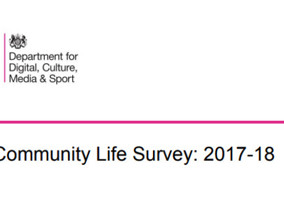At the heart of so much that is good within the voluntary sector are relationships – between staff, volunteers and the people they support, between funders and fundees, between charities themselves – all working towards a common good.
However, there is a real threat to relationships at the most basic level in our communities that is affecting the ability of voluntary sector organisations to deliver change.
In our tenth year, The Big Lunch has commissioned a major new research report to find out how close we are to our neighbours. Closing the distance between us, published last week, has some fairly stark results – more than half of the UK feels distant from their neighbours and one fifth have no-one in their neighbourhoods outside their immediate family they could call on if they needed help or support.
We believe that communities and the connections we have with each other are one of our greatest assets. Yet at the moment, many people feel disconnected – from each other, from their communities and from the wider world. Too many of us are leaning away from the world we inhabit, and we are all dealing with consequences of that.
'The community layer is vital'
Within our many connections, the community layer is a vital support system for individuals: having someone who’ll watch over your home while you’re away, or pop in and feed your cat. These small, modest acts combine into a powerful system that spreads human warmth and empathy through a community.
But that community layer is fraying, a chasm in the relationship between people and their neighbours and neighbourhoods has opened up. It is damaging our mental and physical health and reducing our ability to cope when crisis hits.
That problem is even more critical now as the practical infrastructure underpinning communities is under increasing strain because of austerity and ongoing economic uncertainty, while family relationships and friendships have dissipated because of changes in how we work, live and interact. So, at a time when our communities and individuals within them are under increasing strain, the bridging social capital that really supports their ability to cope is weakening.
This trend is worrying but it is reversible – the report indicates that the majority of people feel it would be better if we were closer to our neighbours, but see there are barriers to them doing so, not least in lacking opportunities to simply get together and start to build relationships with each other.
These communities really matter and we, as the voluntary and charity sector working within communities, urgently need collective effort to bring us all closer together. We have seen the difference a simple act like holding a Big Lunch can make in a community. 80 per cent meet new people at The Big Lunch that they’d like to stay in touch with and 77 per cent feel more confident in getting involved in community activities following the event. What’s more, it has a significant impact on feelings of belonging - 84 per cent of all Big Lunch attendees report feelings of belonging to their neighbourhood, compared to only 61 per cent of non-attendees over the same period. It also helps to raise vitally needed funds –despite not being a focus for the initiative, over £8m was raised for local causes in 2018.
'Charities need to help create healtier neighbourhoods'
Many voluntary sector organisations, ourselves included, are focused on delivering big, positive changes to our society, but that can only be achieved through huge numbers of very modest steps, delivered by people who feel supported and have the agency and opportunity to take action. A strongly knitted together local community is a key component for providing those conditions, which is why our report highlights the need for voluntary sector organisations to help create healthier, happier neighbourhoods. They can do that by:
- Creating opportunities for people to share more, connect with others and have fun
- Supporting and encouraging people to get involved where they live
- Building greater empathy between people and communities
- Celebrating the human and the everyday
- Championing inclusivity and celebrating diversity
- Making The Big Lunch a national shared moment that unites us, our neighbourhoods and communities
Closeness in our neighbourhoods has been eroded over time and is one of those things you only really notice when it has gone. We cannot afford to let the distance between people open up any further. Now’s the time to do everything we can to close the gap.
Peter Stewart is executive director at the Eden Project, which runs The Big Lunch
|
Related articles













